Chinese Homophones // Watch Your Tones!
Chinese Homophones | 116 You Need To Watch Out For
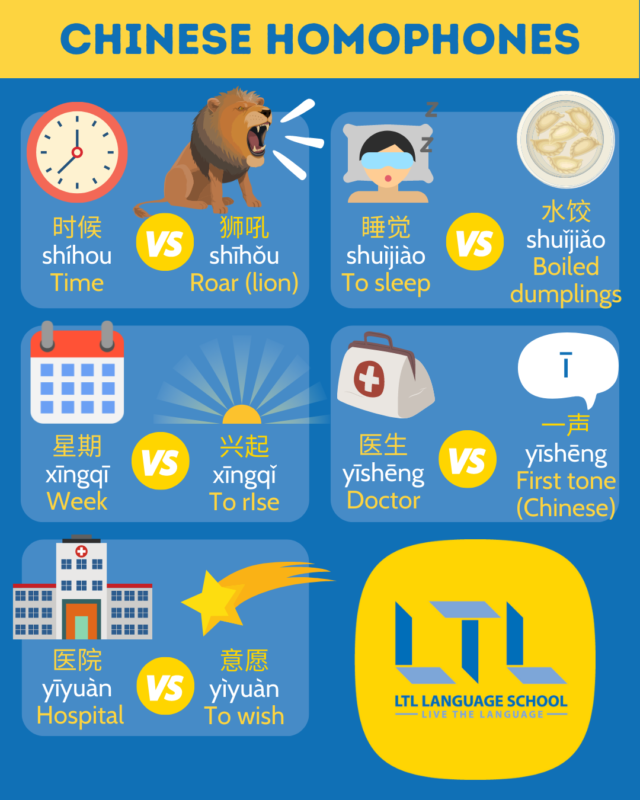
If you’ve been studying Chinese to any level you will know that the importance of tones is absolutely paramount to your success.
Learning them incorrectly at the beginning will mean you need to learn them again properly further down the line, which is a great waste of time and energy.
In this article we’ll introduce you to the world of Chinese Homophones, and this, in a nutshell, will prove to you why learning tones properly is a big deal.
You wouldn’t want to get your boos and wife mixed up, right?
That’s exactly our point: Learn.Your.Tones!
It’s always a good idea to review how to pronounce Chinese tones from time to time, so here are a two video resources to do just that:
Chinese Homophones | Most Common (Beginner Level)
Chinese Homophones | Exact Match
Chinese Homophones | Same Word, Different Tone
QUICK REVIEW | 5 Tips & Tricks to Remember Tones
BONUS | We created a fantastic Chinese Pronunciation Trainer powered by AI to help you get those tones right.
The plus? All lessons are linked to our Flexi Classes, so if you’re studying with us, we highly recommend you start using it.
Most Common Chinese Homophones (Beginner)
With Chinese Homophones you can encounter 2 situations:
- Two words have exactly the same pronunciation and same tones
- Two words have the same pronunciation but different tones
Here’s a quick example to illustrate just that:
- 问 wèn = to ask
- 吻 wěn = to kiss
See why we need to focus on learning the tones?! Whilst these words are different to a native speaker (4th and 3rd tone are used here) – when starting out, these will likely sound the same to you!
Bizarre, yet true. Do you want to ask your teacher, or kiss your teacher – could lead to some embarrassment!
To ease you into the concept of Chinese Homophones, here’s a list of words you’ll encounter at the early stages of your learning.
Pay attention to the tones.
| Chinese | English | Chinese | English |
|---|---|---|---|
| 是 shì | To be | 十 shí | Ten |
| 问 wèn | To ask | 吻 wěn | To kiss |
| 汉语 hànyǔ | Mandarin | 韩语 hányǔ | Korean |
| 伞 sǎn | Umbrella | 散 sàn | To Break Up |
| 四 sì | Four | 死 sǐ | To die |
| 买 mǎi | To buy | 卖 mài | To sell |
| 泰语 tàiyǔ | Thai language | 台语 táiyǔ | Taiwanese |
| 臭 chòu | Smelly | 丑 chǒu | Ugly |
| 花 huā | Flower | 画 huà | Painting |
| 书 shū | Book | 输 shū | To Lose |
| 鱼 yú | Fish | 余 (yú) | Surplus |
| 梨 lí | Pear | 离 lí | To Leave |
| 送钟 sòng zhōng | Gift a clock | 送终 sòng zhōng | To bury a parent |
| 老板 lǎobǎn | Boss | 老伴 lǎobàn | Wife, partner |
Did you notice the words with the exact same tones but different characters?
The context is what will make the sentence clear to the person you are talking to.
Some of these words such as 四, 送钟 and 梨 hold important cultural significance due to their homophones, you’ll find out more in our Chinese Superstitions article.



Chinese Measure Words 🤔 71 Frequently Used (With PDF, Video and Quiz)
Chinese measure words can be one of the most intimidating and confusing things about learning Chinese for beginners – but don’t worry, we’ve got it covered.
Chinese Homophones | Exact Match
Let’s discover some exact Chinese Homophones in more detail. There are quite a few!
Context is key so be sure to learn plenty of vocabulary and sentence structures to be able to explain yourself and give detail when needed.
Otherwise you might end up telling someone you are focusing on your tomb instead of your goals!
| Chinese | English | Chinese | English |
|---|---|---|---|
| 由于 yóu yú | Because | 鱿鱼 yóu yú | Squid |
| 丫头 yā tóu | Girl | 鸭头 yā tóu | Duck head |
| 电源 diàn yuán | Power supplier | 店员 diàn yuán | Clerk |
| 无限 wú xiàn | Infinite | 无线 wú xiàn | Wireless |
| 去世 qù shì | To pass away | 趣事 qù shì | Funny thing |
| 报复 bào fù | Revenge | 抱负 bào fù | Ambition |
| 休养 xiū yǎng | To recuperate | 修养 xiū yǎng | Accomplishment |
| 悲剧 bēi jù | Tragedy | 杯具 bēi jù | Cups |
| 喜剧 xǐ jù | Comedy | 洗具 xǐ jù | Washing tool |
| 医生 yīshēng | Doctor | 一声 yīshēng | First tone (pronunciation) |
| 目的 mùdì | Goal | 墓地 mùdì | Tomb, grave |
| 手势 shǒushì | Gesture | 首饰 shǒushì | Jewellery |
| 攻击 gōng jī | To attack | 公鸡 gōng jī | Rooster |
| 记忆 jì yì | To remember | 技艺 jì yì | Skill / art |
How many of these did you already know?
Let us know in the comments what Chinese homophones we missed!
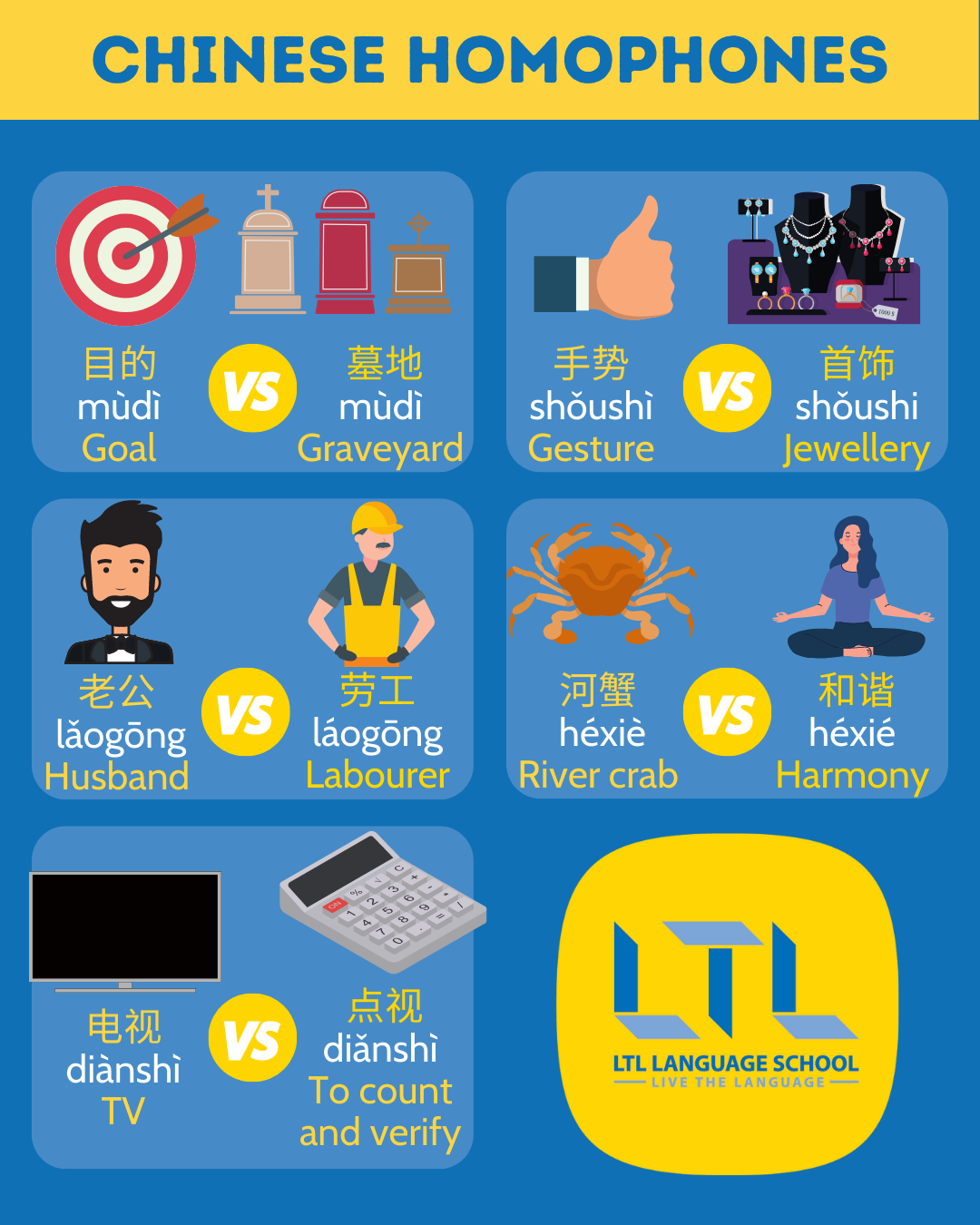
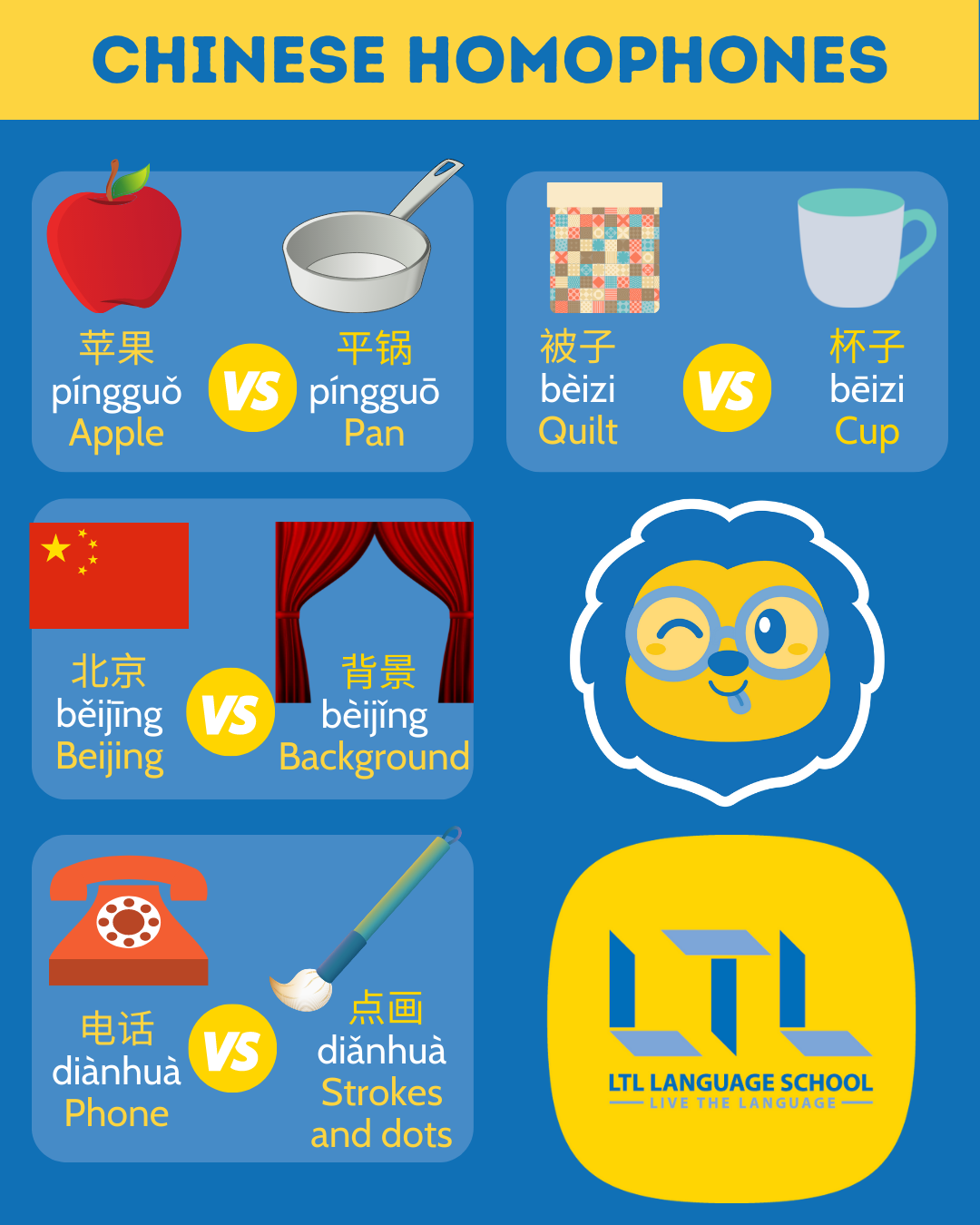
Chinese Homophones | Same Pronunciation, Different Tones
This is the most common case of Chinese Homophone. Whilst the above examples cannot be differentiated with their tone – these examples below can.
Check out if you know these ones already:
| Chinese | English | Chinese | English |
|---|---|---|---|
| 过奖 guò jiǎng | To flatter | 果酱 guǒ jiàng | Jam |
| 苹果 píngguǒ | Apple | 平锅 píngguō | Pan |
| 被子 bèizi | Quilt | 杯子 bēizi | Glass |
| 北京 běijīng | Beijing | 背景 bèijǐng | Background |
| 电话 diànhuà | Telephone | 点画 diǎnhuà | Strokes and dots |
| 电视 diànshì | TV | 点视 diǎnshì | To count and verify |
| 儿子 érzi | Son | 饵子 ěrzi | Fish bait |
| 胸毛 xiōngmáo | Chest hair | 熊猫 xióngmāo | Panda |
| 老师 lǎoshī | Teacher | 牢实 láoshi | Firm and solid |
| 认识 rènshí | To know | 人事 rénshì | HR (Human Resources) |
| 上午 shàngwǔ | Noon | 商务 shāngwù | Commerce |
| 时候 shíhòu | Time | 狮吼 shīhǒu | Lion roar |
| 睡觉 shuìjiào | To sleep | 水饺 shuǐjiǎo | Boiled dumpling |
| 星期 xīngqí | Week | 兴起 xīngqǐ | To rise |
| 医院 yīyuàn | Hospital | 意愿 yìyuàn | To wish |
| 老公 lǎogōng | Husband | 劳工 láogōng | Labour |
| 河蟹 héxiè | River crab | 和谐 héxié | Harmony |
| 业主 yè zhǔ | Owner | 野猪 yě zhū | Wild boar |
| 茶具 chá jù | Tea set | 差距 chā jù | Gap |
| 绊住 bàn zhù | To entangle | 版主 bǎn zhǔ | Forum moderator |
| 上海 shànghǎi | Shanghai | 伤害 shānghài | To harm |
| 包子 bāozi | Steamed bun | 豹子 bàozi | Leopard |
| 病 bìng | Disease | 冰 bīng | Ice |
| 生气 shēngqì | Angry | 升起 shēngqǐ | To rise |
| 各个 gège | Each; every | 哥哥 gēgē | Elder brother |
| 买家 mǎi jiā | Buyer | 卖家 mài jiā | Seller |
| 习惯 xíguàn | Habit | 吸管 xīguǎn | Straw |
| 知道 zhīdào | To know | 直到 zhídào | Until |
| 美丽 měilì | Beautiful | 魅力 mèilì | Charm |
| 派对 pàiduì | Party | 排队 páiduì | To line up |
Surprised at how many there are? Don’t worry! Check out the next chapter to review how to learn your tones properly.
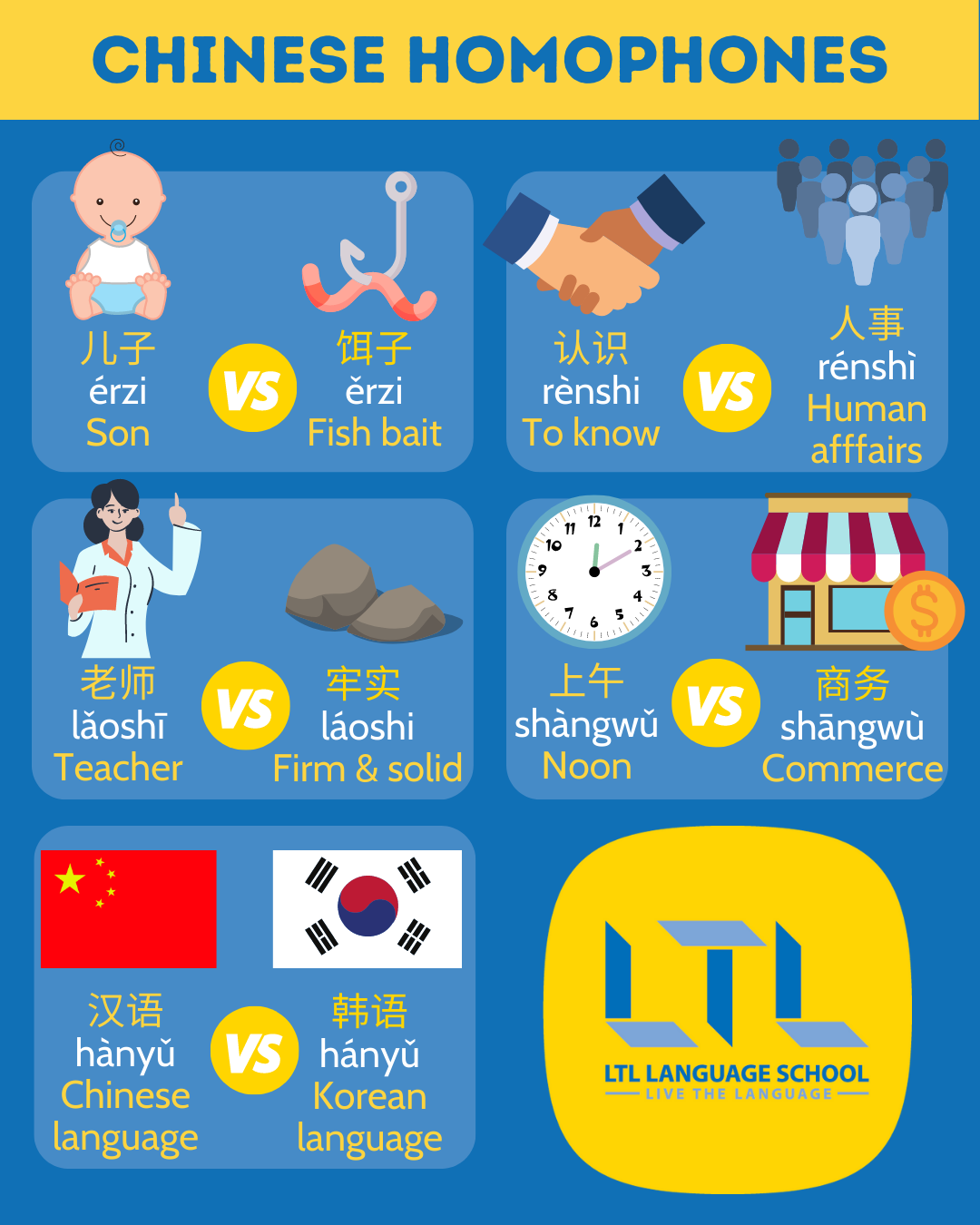
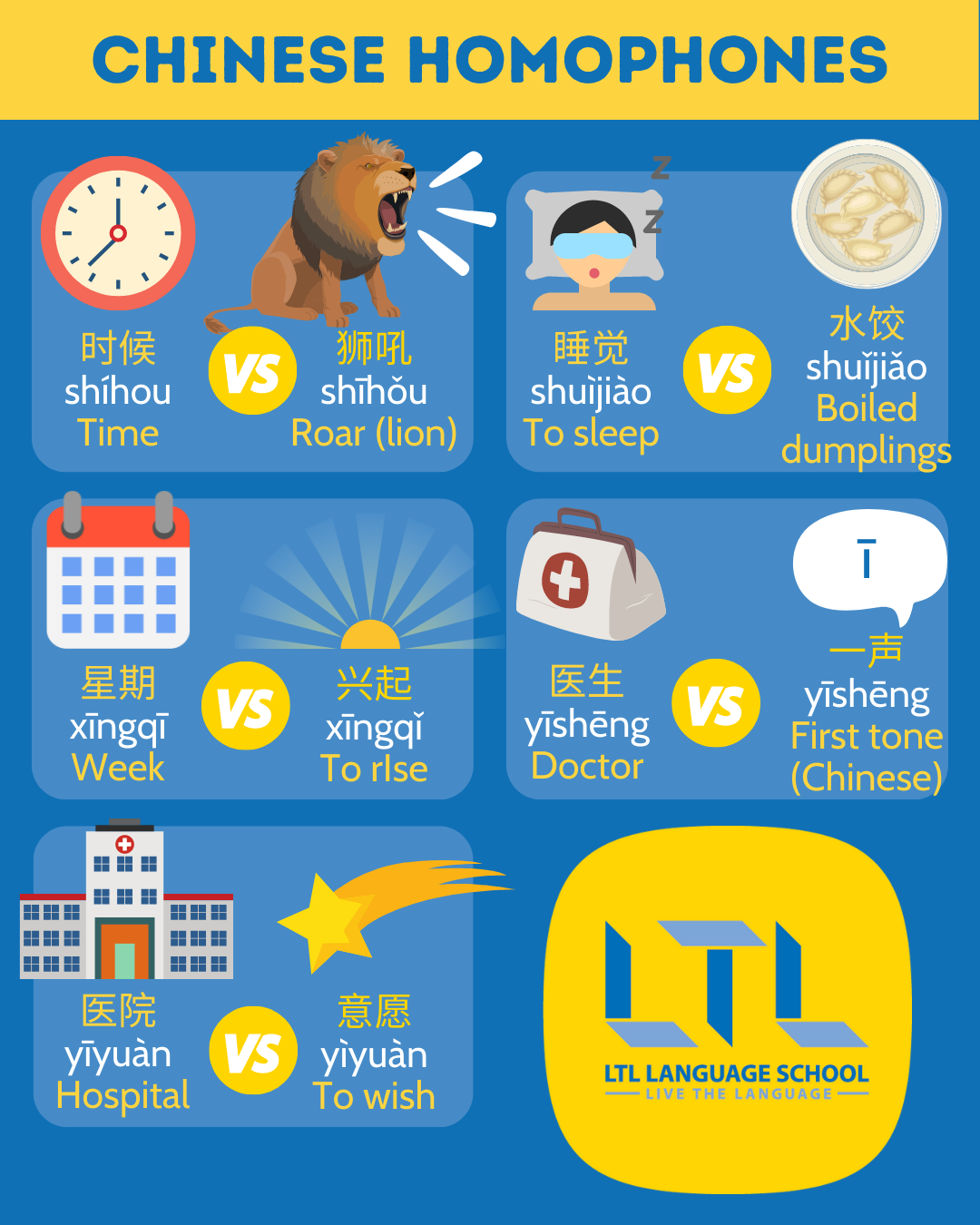

Basic Mandarin 📣 105 Simple Phrases To Make Your Life Easier
Basic Mandarin Phrases – Learn the Chinese greetings and other basic phrases in minutes with our pocket guide for Chinese beginners,
CHINESE TONES | 5 TIPS & TRICKS
These tips and tricks we are about to share all come from our blog article How To Remember Chinese Tones Forever.
Ready to get the advice that could change everything?
Let’s go:
Say The Tones with Gestures
This can be a silly trick for some, but I can assure you it works.
All you have to do is mimic the movement of the tone with either your finger or your whole hand, kind of like a conductor of an orchestra.
Here’s an analysis for each tone:
- First tone (—) — Draw a straight line above your head to keep your pitch high and level. Notice how characters in the first tone tend to sound longer than the others, so try to draw a longer line or draw the imaginary line slowly.
- Second tone (/) — Draw a diagonal quickly from the bottom left to the top right to slightly increase the pitch of your voice.
- Third tone (V) — Draw a “V” or a “U” as a guide to scoop or drop, and then raise your pitch.
- Fourth tone (\) — Draw a diagonal quickly from the top left to the bottom right to add a hard stress to the pinyin.
- Fifth/Neutral tone (.) — Draw a dot to keep the pronunciation short and succinct.
Exaggerate The Tones
Giving that extra punch increases the chance of you actually remembering how the tones should sound, and the more you do this, the more you will improve your pronunciation.
All you have to do is exaggerate it a little more, turning it into a little theatrical production of your own, if you will.
Always Have a Dictionary
It is completely normal to have doubts about the pronunciation and tones of a given word.
Having a dictionary will help you correct yourself, shed clarity on the situation and find answers to your questions.
Pleco is your best friend here. The app functions as an integrated dictionary, document reader and flashcard system with handwriting input, so it’s fully equipped to assist you with any of your translation needs.
Sing Songs & Practice Tone Twisters
One of the best ways as a beginner to get your mouth muscles accustomed to Chinese tones and pronunciation is to sing Chinese songs and practice Chinese tongue twisters.
In order to speak Chinese with a native accent, students have to ensure they are always using proper inflection and training their muscles to create sounds that are not used in English.
Tongue twisters in Mandarin will teach beginner speakers to communicate with firm, clear enunciation, creating the foundation for natural-sounding speech as they continue to develop their Chinese language abilities.
Listen to the Radio & Watch TV
For intermediate or advanced learners, listening to some Chinese radio or watching Chinese TV is a great way to practice tones and pronunciation.
While conversations are also great practice, one of the best things about spoken Chinese in broadcast media is that everything is enunciated with the correct tones, whereas some tones might be mumbled in real-life dialogue.
From international news stations to pop music and cultural programs, there are numerous Chinese radio stations that’ll give you opportunities to listen for real world usage of tones.
Alternatively, animated cartoons for clearly pronounced, repetitive phrases are extremely beneficial.
We hope this article was useful and helped you understand the Chinese language a bit better!
Let us know if we missed any Chinese Homophones in the comment section.
Make sure to check our How To Remember Chinese Tones Forever blog article for even more advice on how to get your pronunciation just right.
Are you taking Chinese classes with a professional teacher already?
If not, we strongly recommend you to check out our Flexi Classes platform, which allows you to learn Chinese 24/7 (and other Asian languages) by choosing your study time and study topic.
FREE TRIAL | You can claim a 7 Day Free Trial right here.
FREQUENTLY ASKED QUESTIONS
What are Chinese Homophones?
Homophones are two words with the same pronunciation, with a different meaning.
For example: 墓地 (mùdì) means grave, however 目的 (mùdì) means goal.
You need to be very careful with your tones, as it could change the meaning of your whole sentence!
Are there any good ways to practice my Chinese pronunciation?
Check out our Chinese Pronunciation Trainer.
It is powered by AI and recognise your voice, to then let you know if your pronunciation is correct, or where you didn’t do well.
All lessons available actually come from our Flexi Classes platform, so if you are studying with us already we strongly recommend you use it to review a class.
If you are not a student of Flexi Classes yet, make sure to claim your 7 Day Free Trial here.
Can I download your infographics for personal use?
Yes you can.
However if you wish to share them, always be sure to credit us.
You can find us on most social media platforms, our main ones being:
– Instagram at @ltl_mandarin
– Facebook at @LTL_School
– Twitter at @LTL_School
– TikTok at @ltl_mandarin
Do you teach Chinese Homophones in class?
Yes, whenever there are some in the lesson the teacher will explain every new word, and help you review your tones if necessary.
Did you take lesson on our Flexi Classes platform already?
If not, make sure to claim you 7 Day Free Trial here.
Where can I find more articles like this one?
For more resources similar to this topic, here’s a list of articles you might find interesting:
Want more from LTL?
If you wish to hear more from LTL Mandarin School why not join our mailing list.
Sign up below and become part of our ever growing community.
WANT TO STUDY CHINESE FREE FOR A WEEK? Check out Flexi Classes and get 7 days for free.
We’ve got the best teachers, from the comfort of your own home!
BONUS | Want to learn Chinese in China? Check out our lessons in Beijing.
![[𝗢𝗟𝗗] LTL Beijing Logo](https://old.ltl-beijing.com/wp-content/uploads/logo-ltl-header.png)

 Hi, my name is Sabatino! I am from Italy and I am a Student Advisor at LTL. Fancy coming to study with us in China? Drop me a message.
Hi, my name is Sabatino! I am from Italy and I am a Student Advisor at LTL. Fancy coming to study with us in China? Drop me a message.

